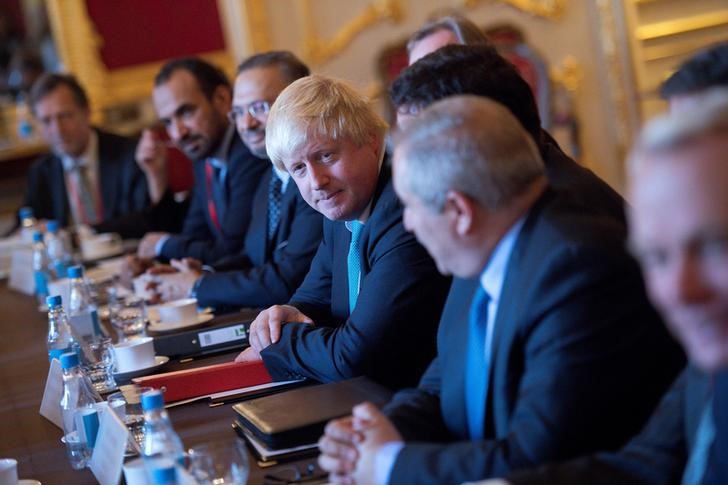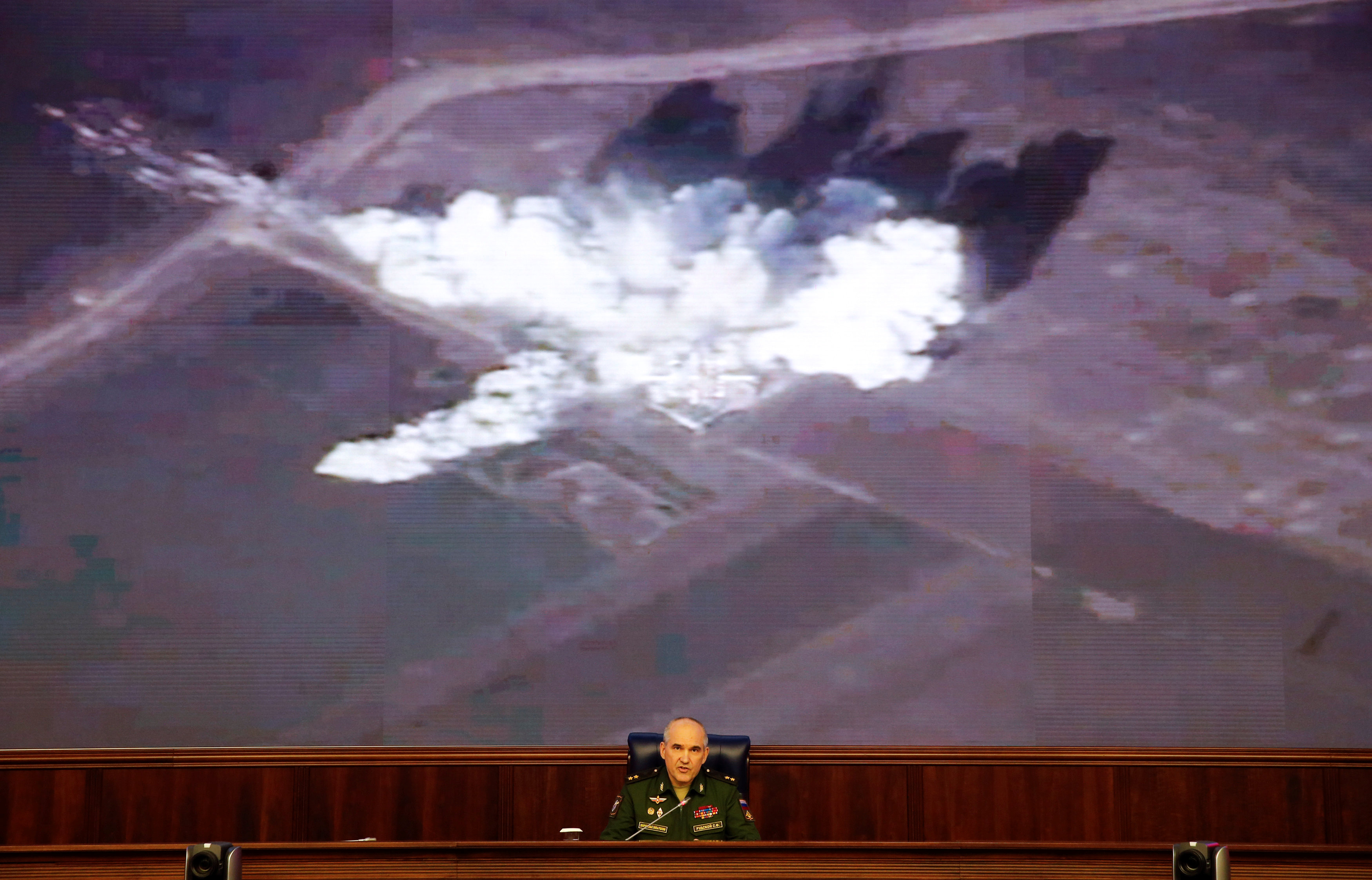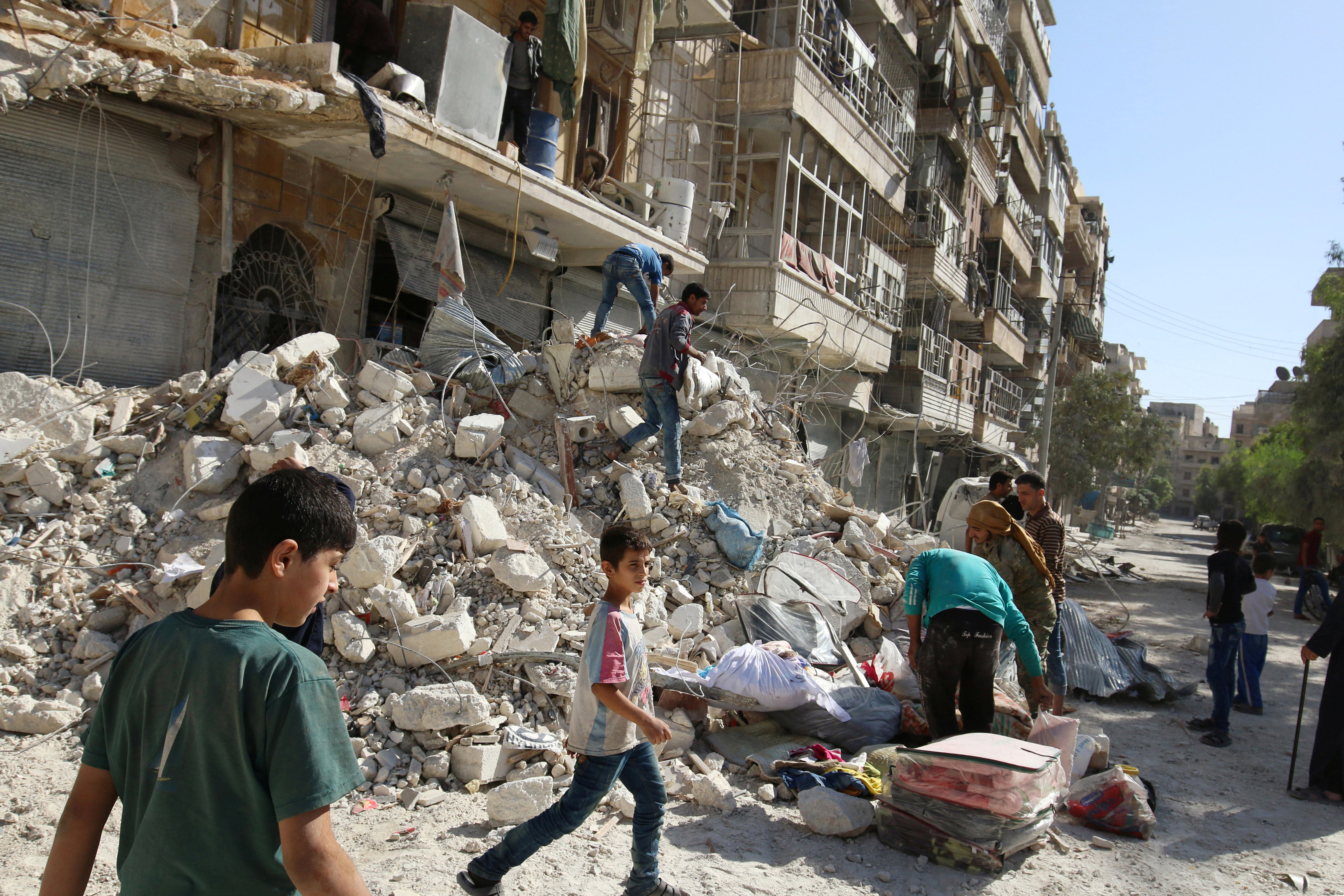
By Tom Perry and Ellen Francis
BEIRUT (Reuters) – A senior rebel commander said on Friday that Syrian government forces would never be able to capture Aleppo’s opposition-held east, more than three weeks into a ferocious offensive, but a military source said the operation was going as planned.
Russian air strikes were proving of little help to government ground forces in urban warfare, the deputy commander of the Fastaqim rebel group in Aleppo said. While air strikes have pounded much of the city, they have avoided frontlines where the sides are fighting in close proximity, apparently out of fear they could hit the wrong side, he said.
The rebels were well prepared for a siege imposed this summer, and preparations for a counter attack were under way, Melhem Akidi told Reuters.
“Militarily there is no danger to the city of Aleppo,” he said, adding: “The more dangerous thing is the daily massacres by the regime that are targeting not just the people but the foundations of life in Aleppo.”
However, the Syrian military source and a second pro-government military source in the field said the campaign was on course, reiterating denials that civilians were being targeted.
“The accomplishments so far are moving according to the plan, and we are working according to gradual steps,” said the second source, a non-Syrian and part of a regional alliance fighting in support of President Bashar al-Assad.
The assessments, on the eve of a meeting between U.S. and Russian foreign ministers in Switzerland to try to resume their failed efforts to find a diplomatic solution, point to a protracted battle for Aleppo.
Syria’s biggest city before the war has been divided into areas controlled by the government and rebels for several years. The rebel-held east is the last major urban stronghold of the nationalist rebels fighting Assad, and recapturing it would be a major strategic prize.
The Syrian army, supported by Iranian-backed militias and Russian air power, announced a major offensive to capture the rebel-held part of the city on Sept. 22, unleashing firepower not previously seen in the 5-1/2-year long war.
The onslaught has killed several hundred people and flattened many buildings. Hospitals have also been hit, leading the United States and France to accuse Russia and the Syrian government of war crimes.
Moscow and Damascus say they are only targeting militants.
ONSLAUGHT THREATENS BREAD SUPPLY
A member of Aleppo’s opposition city council told Reuters fuel reserves used to operate bakeries could run out in a month if the siege persists. A mill was bombed on Wednesday, another threat to the city’s bread supply, he said.
The air strikes have been accompanied by ground assaults by government forces, including Shi’ite militias from Iraq and Lebanon. Their clearest advance so far is the capture of ground to the north of Aleppo, including the Handarat camp.
The army has also reported gains in the city center itself. The rebels have consistently said these have been repelled. A Syrian military source said the army had gained control over several industrial facilities and an agricultural college located in northeastern Aleppo on Friday.
The Syrian Observatory for Human Rights, a British-based group monitoring the war, said the government advances so far did not match the intensity of the firepower unleashed.
The bombardment was expected to bring “much greater results”, Observatory Director Rami Abdulrahman said.
Syria’s civil war has killed 300,000 people and left millions homeless while dragging in regional and global powers and allowing for the expansion of jihadist groups including Islamic State, which controls wide areas of the east.
While Assad is backed by Russia, Iran and an array of Shi’ite militias from Arab neighbors, the Sunni rebels seeking to oust him are backed by Turkey, the United States and Gulf monarchies.
LITTLE HOPE FOR PEACE TALKS
U.S. Secretary of State John Kerry will meet his Russian counterpart Sergei Lavrov in Lausanne, Switzerland, on Saturday, possibly joined by ministers from Turkey, Qatar, Saudi Arabia and Iran.
American officials have voiced little hope for success, however, and Lavrov said on Friday he had “no special expectations” for the talks.
Kerry broke off talks with Lavrov last week over the Aleppo offensive. The resumption of negotiations, despite the fighting, was a sign of the lack of options facing Western nations over the Syria conflict, where they worry increased arms supplies for the rebels could end up in the hands of jihadist groups.
The Syrian government and its allies have been steadily encircling the rebel-held east of Aleppo this year, first cutting the shortest route to nearby Turkey, before fully blockading the city this summer.
Assad said this week capturing Aleppo would be a springboard for pushing militants to neighboring Turkey, a major sponsor of the rebellion.
He has offered the Aleppo rebels an amnesty if they lay down their arms, though they have dismissed it as a trick.
ALEPPO “STEADFAST”, FUEL RUNNING OUT
Akidi, speaking from Aleppo, said he was “certain that nobody would be able to storm” the east, which he said could not be compared to other less populous and less well-armed areas that have been captured from rebels by the government.
“Everyone who stayed in Aleppo, which was under threat of siege for a long time, has prepared for steadfastness,” he said.
He also noted the proximity of nearby insurgent strongholds west of Aleppo and in Idlib province, and what he described as the government’s “fragile” hold over an important access point on the city’s southern periphery. “I do not rule out that the revolutionaries will be able to break the siege soon,” he said.
The United Nations Office for the Coordination of Humanitarian Affairs (OCHA) said in a report on Thursday that 406 people had been reported killed and 1,384 wounded in eastern Aleppo from Sept. 23 until Oct. 8. In government-held western Aleppo, which is frequently targeted by rebel shelling, 91 people including 18 children were killed over a similar period.
Muhammad Sandeh, of the opposition city council, said a fuel reserve controlled by the council could dry up in eastern Aleppo in a month or less if the siege persists.
“There are enough bakeries, but there isn’t enough flour or fuel,” Sandeh told Reuters from Aleppo. “The families get half of their bread needs,” he said. The air strike on a mill on Wednesday had severely reduced bread supply, he said.
Water supplies have also been affected by the violence.
OCHA said the situation had improved slightly after the parties reached an Oct. 10 agreement to protect water stations from the conflict.
Ibrahim Abu al-Laith of the Civil Defence rescue service that operates in rebel-held areas said that even after pumping stations were repaired and the water returned, it couldn’t reach residents due to a lack of fuel.
Fuel is the lifeline of the eastern districts, he said.
“Ours is running out.”
(Writing by Tom Perry; Editing by Pravin Char)












